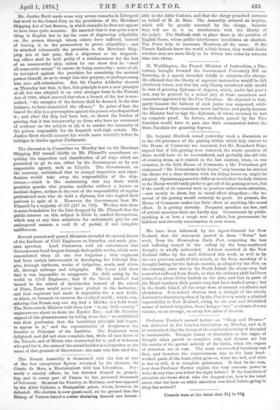Mr. Justice Brett made some very severe remarks in Liverpool
last week to the Grand Jury on the provisions of the Merchant Shipping Act of last Session, in which remarks he does not appear to have been quite accurate. He asserted that it was quite a new thing in English law to lay the onus of disproving culpability on the person through whom others have suffered, instead of leaving it to the prosecution to prove culpability ; and he attacked vehemently the provision in the Merchant Ship- ping Act of last year, that a shipowner or his despatch- ing officer shall be held guilty of a misdemeanour for the loss of an unseaworthy ship, unless he can show that he "used all reasonable means" to ensure its being seaworthy ; most of all, he inveighed against the provision for examining the accused person himself, so as to tempt him into perjury, or perhaps entrap him into self-crimination. But Sir Charles Adderley showed -on Thursday last that, in fact, this principle is not a new principle at all, but was adopted in an even stronger form in the Factory Act of 1844, which enacted that when a breach of the Act is com- mitted, "the occupier of the factory shall be deemed, in the first instance, to have committed the offence." In point of fact, the loss of the ship is a presumption against the person who despatched it ; and after the ship had been lost, to throw the burden of -proving that it was unseaworthy on those who have no command of evidence on the subject at all, is to render the immunity of -the person responsible for its despatch well-nigh certain. Mr. Justice Brett should measure his words more carefully before he indulges in tirades against Parliament.


































 Previous page
Previous page